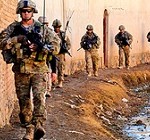Against the backdrop of the imminent deadline for the withdrawal of U.S. troops from Afghanistan in 2014, several actors on the Afghan stage are performing a sequence of twists and turns.
The Doha office drama was the talk of the town three weeks ago, when the U.S. signalled its intention to negotiate with the Afghan Taliban, who called their Doha office the ‘Islamic Emirate of Afghanistan’; this resulted in Afghan President Hamid Karzai suspending security talks with the U.S. Thereafter, the attack on Karzai’s presidential palace was the high point two weeks ago.
The most recent episode is an article in The New York Times, which suggests that the U.S. may be considering the ‘zero option’. On July 9, The New York Times published an article which said, “…President Obama is giving serious consideration to speeding up the withdrawal of United States forces from Afghanistan and to a ‘zero option’ that would leave no American troops there after next year…” [1]
Officially, the U.S. has been ambiguous. The White House press briefing on July 9 sounded more like a ‘maybe’ rather than a ‘yes’ or ‘no.’ [2] This has driven policy analysts and experts on the region to publish several hurried analyses.
However, it is far from probable that the ‘zero option’ will indeed become a reality. An aid-worker based in Kabul says, “Anyone who thinks that the U.S. is going to leave for good anytime soon is mistaken.”
If the ‘zero option’ does transpire, what are the possible implications for the U.S. as well as for Afghanistan?
The U.S. would like to retain nine bases in Afghanistan after 2014. However, this is possible only if the Afghan president signs the Bilateral Security Agreement, which will allow the bases to remain. Without the nine bases, which the U.S. has reportedly spent millions of dollars to renovate, the U.S. will not have a presence in a volatile region that it would like to influence: Iran to the west, Pakistan to the east, and China to the northeast; alongside the Chinese presence in the strategically located Gwadar port in Pakistan.
The ‘zero option,’ if adopted, will embolden the Taliban – which wants to be seen as a credible player in the Afghan government. As a consequence, the already tense security situation in the country will deteriorate. The Taliban wants to negotiate with the U.S., but they also consider the Haqqani network – deemed a terrorist organisation by the Obama administration – as part of their band. Karzai’s suspension of talks on the Bilateral Security Agreement, to demonstrate that he is not controlled by the U.S, is not helping the negotiations, which had dim prospects of being successful in the first place.
If the U.S. does go ahead with the ‘zero option’, this will ruin its relationship with its allies in the region, such as Tajikistan and Uzbekistan. With an emboldened Taliban, there is a threat of violence and terrorism spilling over into these and other neighbouring countries that are providing land routes for supplies, refuelling and other services for the U.S. bases in Afghanistan.
The U.S. will also have to deal with the possibility of Russia’s attempts at stabilising Afghanistan through the Collective Security Treaty Organization; Moscow has been pushing for it at NATO meetings for some time now.
Recent reports that China has offered to develop Iran’s Chabahar port – a strategically located port that India is likely to assist in developing – also signals something. With all the U.S. forces gone, China will be more than happy to swoop in to “stabilise” the country.
Considering that all this will go against the strategic interests of Washington, the ‘zero option’ is unlikely to become a reality. As a resident of Kabul says, “There are far too many factors involved here. It’s not easy to get up and leave from this country. They know it, and so do we.”
Regardless of all the speculations, the word on the street in Kabul is that the U.S is modulating the entire discussion with an aim to influencing public opinion and thereby coercing Karzai into signing the security agreement in complete compliance with U.S. terms.
Meanwhile, with elections scheduled for next year, the biggest concerns of the people are a stable economic and political situation.
Rajeshwari Krishnamurthy is the Content Manager at Gateway House.
This blog was exclusively written for Gateway House: Indian Council on Global Relations. You can read more exclusive content here.
For interview requests with the author, or for permission to republish, please contact outreach@gatewayhouse.
© Copyright 2013 Gateway House: Indian Council on Global Relations. All rights reserved. Any unauthorized copying or reproduction is strictly prohibited
References
1. Mazzetti, M., & Rosenberg, M. (8 July 2013). U.S. considers faster pullout in afghanistan. The New York Times. Retrieved from http://www.nytimes.com/2013/07/09/world/asia/frustrated-obama-considers-full-troop-withdrawal-from-afghanistan.html?cid=nlc-dailybrief-daily_news_brief-link2-20130709&_r=0
2. The White House, Office of the Press Secretary. (7 September 2013). Press Briefing. Retrieved from http://www.whitehouse.gov/the-press-office/2013/07/09/daily-briefing-press-secretary-jay-carney-07092013


